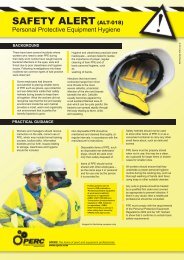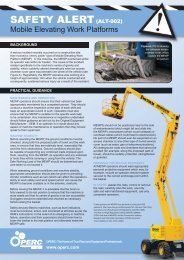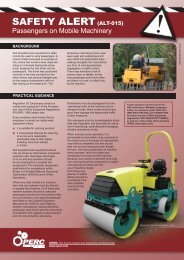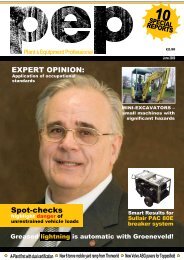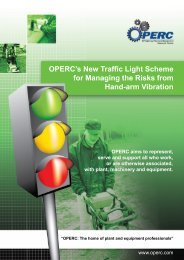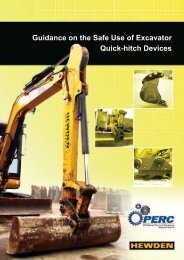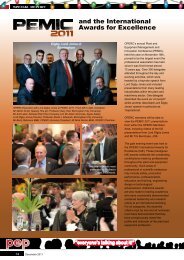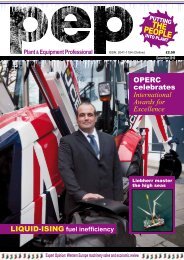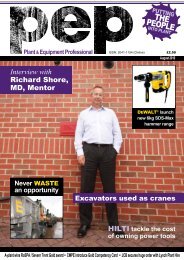the PeoPle - OPERC - Off-highway Plant and Equipment Research ...
the PeoPle - OPERC - Off-highway Plant and Equipment Research ...
the PeoPle - OPERC - Off-highway Plant and Equipment Research ...
You also want an ePaper? Increase the reach of your titles
YUMPU automatically turns print PDFs into web optimized ePapers that Google loves.
Birmingham City University, recently<br />
began a research study to investigate<br />
how <strong>the</strong> wider economic climate may<br />
be affecting construction <strong>and</strong> its<br />
associated supply chain structures.<br />
The initial phase of <strong>the</strong>ir work has<br />
conducted interviews among a sample<br />
of key supply chain stakeholders;<br />
mainly across SMEs who employ<br />
off-<strong>highway</strong> plant <strong>and</strong> equipment<br />
assets in <strong>the</strong>ir business activities.<br />
The aim of <strong>the</strong>se interviews was to<br />
identify what participants perceive<br />
as <strong>the</strong> main enablers, barriers <strong>and</strong><br />
<strong>the</strong>mes relating to construction <strong>and</strong> its<br />
supply chains at <strong>the</strong> moment. While<br />
<strong>the</strong> study is in its embryonic stages,<br />
this short article sets about highlighting<br />
some of <strong>the</strong> early findings of <strong>the</strong> work.<br />
In particular, for <strong>the</strong> benefit of PEP<br />
readers, those relating to plant <strong>and</strong><br />
equipment supply chain players.<br />
The principal <strong>the</strong>mes highlighted<br />
by initial analysis of <strong>the</strong> interviews<br />
conducted as part of <strong>the</strong> research study<br />
are: changing supply chain relationships;<br />
pricing pressures <strong>and</strong> o<strong>the</strong>r financial<br />
issues; pressures on project programme<br />
timing; changing clients’ roles; <strong>and</strong><br />
negative forces acting on health <strong>and</strong><br />
safety. These evolving key <strong>the</strong>mes are<br />
each now briefly discussed in turn.<br />
changing<br />
relationships<br />
Many of those within subcontract<br />
supply organisations<br />
(such as specialist trades <strong>and</strong><br />
operator/plant suppliers) feel that<br />
former supply chains have been<br />
eroded, or in <strong>the</strong> extreme, have<br />
broken down altoge<strong>the</strong>r. One<br />
interviewee commented on how<br />
much effort <strong>the</strong>ir company had<br />
put into forging good links with<br />
clients such as main contractors<br />
over recent years by way of,<br />
for example, entering into<br />
partnering or preferred supplier<br />
relationships. For many, <strong>the</strong>se<br />
relationships have unfortunately<br />
gone <strong>and</strong> it is broadly felt that <strong>the</strong><br />
emphasis is now almost entirely<br />
on cost at <strong>the</strong> expense of all else,<br />
including possible fragmentation<br />
or erosion of business-tobusiness<br />
relationships.<br />
One research participant<br />
explained that in tendering for a<br />
particular contract, his company<br />
had expended a lot of time <strong>and</strong><br />
resources assessing how to<br />
best approach <strong>the</strong> job, which<br />
people to assign to it <strong>and</strong> what<br />
plant <strong>the</strong>y should use, taking<br />
account of <strong>the</strong> nature of <strong>the</strong> work<br />
<strong>and</strong> <strong>the</strong> risks <strong>the</strong>y expected to<br />
encounter. He said that he had<br />
trimmed everything to <strong>the</strong> bone<br />
without compromising quality<br />
or encouraging hazardous<br />
working <strong>and</strong> yet, <strong>the</strong> client<br />
simply came back <strong>and</strong> said “I<br />
want a 10% reduction in cost”.<br />
It was concluded that: “...after<br />
you’ve trimmed everything else,<br />
<strong>the</strong> only thing left is to reduce <strong>the</strong><br />
programme time, which creates<br />
even greater pressures on site<br />
<strong>and</strong> encourages corners to be<br />
cut. Quality <strong>and</strong> safety have to<br />
be affected”. The situation was<br />
summed up succinctly by ano<strong>the</strong>r<br />
interviewee who said: “It seems<br />
<strong>the</strong> former supply chains, <strong>the</strong><br />
former relationships, have gone...<br />
it’s back to <strong>the</strong> bad old days. It’s<br />
all now simply down to price”.<br />
Special reports, Latest news, Worldwide distribution & Expert opinions<br />
SPECIAL REPORT<br />
Pricing pressures <strong>and</strong><br />
o<strong>the</strong>r financial issues<br />
Previous examples highlighted reinforce<br />
<strong>the</strong> downward pressures on pricing <strong>and</strong><br />
<strong>the</strong> cutthroat competition between supply<br />
chain members. Many of those interviewed<br />
stated that <strong>the</strong>y knew work was being<br />
priced at cost with “...no allowance for plant<br />
operator, plant cost or fuel”. Effectively,<br />
<strong>the</strong> plant <strong>and</strong> equipment component of<br />
some bids is subsidising o<strong>the</strong>r costs of<br />
<strong>the</strong> work package being tendered for, to<br />
try <strong>and</strong> secure <strong>the</strong> contract. For many<br />
firms at <strong>the</strong> moment, turnover, survival,<br />
ability to pay <strong>the</strong> VAT <strong>and</strong> such factors<br />
are all more important than profit.<br />
Of particular interest is an evolving sub<strong>the</strong>me<br />
which concerns <strong>the</strong> role of <strong>the</strong><br />
Banks <strong>and</strong> <strong>the</strong> longevity of ‘troubled’ firms.<br />
It was felt by some that Banks are letting<br />
companies continue to trade, where in <strong>the</strong><br />
past <strong>the</strong>y may have ‘pulled <strong>the</strong> rug’ from<br />
beneath <strong>the</strong>m. The main reason for this is<br />
felt to be a reluctance on <strong>the</strong> Banks’ part<br />
to add ever more bad debt or bad news to<br />
<strong>the</strong>ir books, combined with an attitude of<br />
‘turnover is turnover’ regardless of margin.<br />
The perception is that <strong>the</strong> Banks are happy<br />
to continue giving time to firms that secure<br />
work, without considering whe<strong>the</strong>r that work<br />
is profitable: “The firm comes to <strong>the</strong> Bank<br />
<strong>and</strong> says, look we’ve got an order for £2M,<br />
but <strong>the</strong> bank doesn’t know if <strong>the</strong> tender<br />
price should realistically be £2.5 or £2.6M”.<br />
As a consequence of this behaviour, <strong>the</strong><br />
ongoing survival of some firms who are<br />
‘buying work’ is actually helping to continue<br />
suppression of <strong>the</strong> market. In effect, <strong>the</strong><br />
slightly artificial higher level of supply (than<br />
has typically previously been witnessed in<br />
recessionary times) is adding downward<br />
pressure on pricing levels. One respondent<br />
summed this up by saying “...I am amazed<br />
that at least 50% more companies<br />
haven’t gone bust than have done”.<br />
From a more positive perspective, one<br />
participant did highlight that <strong>the</strong> continuing<br />
pressure to trim business operating<br />
costs <strong>and</strong> overheads, has forced <strong>the</strong>m<br />
to look hard at how <strong>the</strong>y might innovate<br />
to help achieve this. In this instance, <strong>the</strong><br />
company had done so by introducing an<br />
IT system to more efficiently administer<br />
operations <strong>and</strong> keep stricter tabs on<br />
ordering, buying <strong>and</strong> cost control per-se.<br />
April 2011<br />
27



